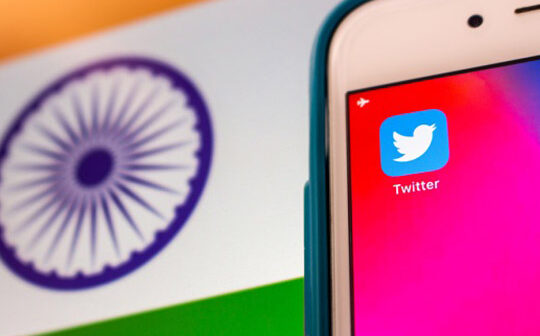
Written by Sarosh Bana, Mumbai Correspondent.
Twitter co-founder and former CEO Jack Dorsey stirred a political storm in India by recalling how the Narendra Modi government had threatened to ban his microblogging platform and launch raids on its employees in the country if certain tweets it found undesirable were not taken down.
In a recent interview to YouTube channel Breaking Points, Dorsey, when asked about government pressures he faced during his time as CEO of Twitter, said, “India is a country that had many requests of us around the farmers’ protest, around particular journalists that were critical of the government, and it manifested in ways such as ‘we will shut Twitter down in India’ – which is a very large market for us – ‘we will raid the homes of your employees’ – which they did – ‘we will shut down your offices, if you don’t follow suit’ – and this is India, a democratic country.”
It was in November 2021 that Dorsey had quit Twitter, which was then acquired the following year by Elon Musk, the world’s richest man who Bloomberg Billionaires Index credits with a net worth of $192 billion.
In his interview to Breaking Points, an American political news and opinion series hosted by Krystal Ball and Saagar Enjeti, Dorsey bracketed India with Turkey and Nigeria as countries that have resorted to threats of a ban if Twitter were to fail to comply with government requests.
Musk, as Twitter CEO, had aired similar views on India’s social media regulations, terming them “strict” and mentioning in April that he would rather comply with the government’s blocking orders than risk sending Twitter employees to jail.
Both Dorsey and Twitter were evidently referring to the Modi government’s IT (Intermediary Guidelines and Digital Media Ethics Code) Rules of 2021 that have lashed internet intermediaries and digital news platforms with a host of compliance obligations. Several of them have had to face the wrath of the government and even court cases for any perceived delay in adherence.
As always, the Indian government’s response to such criticism was swift and sharp. Accusing Dorsey of an “outright lie”, Minister of State for Electronics and IT, Rajeev Chandrasekhar, asserted that under then CEO Dorsey, Twitter was in “repeated and continuous violations of Indian law” and at times “weaponised misinformation”. He claimed that no one from Twitter had gone to jail nor was the platform “shut down”, despite having been in “non-compliance with law repeatedly from 2020 to 2022, and it was only in June 2022 when they finally complied”.
“Dorsey’s Twitter regime had a problem accepting the sovereignty of Indian law; it behaved as if the laws of India did not apply to it,” said Chandrasekhar. “India as a sovereign nation has the right to ensure that its laws are followed by all companies operating in India.” He added that the Centre was “obligated” to issue takedown orders during the farmers’ protest in 2021, as there was “a lot of misinformation and reports of genocide which were definitely fake”. The Minister went on to say, “Such was the level of partisan behaviour on Twitter under Jack’s regime, that they had a problem removing misinformation from the platform in India, when they did it themselves when similar events took place in the USA.”
Nevertheless, an earlier analysis by mainstream broadsheet Indian Express of Twitter’s global transparency reports recorded “a significant surge in legal demands” — from the government and various courts — to remove content from Twitter between 2014 and 2020. “Incidentally, in the same time period, the number of content blocking orders issued to social media companies by the government has also increased by almost 2,000 per cent, data shared with Parliament showed, highlighting the growing trend of online censorship in India,” the paper indicated.
The report adds that in the first six months of 2021, Twitter was asked by various Indian courts and the government to block a little more than 4,900 tweets, as also to take down some tweets critical of the government’s handling of Covid-19.
In his article titled, Twitter throws down the gauntlet, in APSM of June 30, 2021, this writer had noted: “As the government-Twitter standoff simmered, the Ministry of Electronics and IT (MeitY) sent Twitter a final notice, which noted that “your responses to the Ministry’s letters neither address the clarifications sought by this Ministry nor indicate full compliance with the rules”.” The notice resulted in Twitter’s losing its intermediary status in India and becoming liable for users posting any content deemed ‘unlawful’ by the government.
The article mentioned that while Google and Facebook were agreeable to complying with the new IT Rules, Twitter was hedging, terming the government decision a “dangerous overreach that is inconsistent with open, democratic principles”. Curiously, Facebook-owned WhatsApp had taken the government to court over the issue.
In his another article titled, Taming India’s Social Media, in APSM of December 21, 2021, this writer had noted: “Last year [in 2020], the Modi government had similarly targeted Twitter because its then CEO, Jack Dorsey, had ‘liked’ tweets of international pop star Rihanna, Sweden’s teenaged climate activist Greta Thunberg, adult-star-turned-model Mia Khalifa, and US Vice President Kamala Harris’s niece, Meena Harris, supporting Indian farmers then agitating against government policy. BJP [ruling Bharatiya Janata Party]leaders had reviled these four women, their anger echoed online by the legions of government-sponsored trolls and pro-establishment film stars and cricketers.”
The article pointed out that Indian authorities had sought the blocking of Twitter handles of 350 farmer leaders, even as India’s social media were awash with posts that deemed it demeaning that the government of the world’s largest democracy could so ‘over react’ to celebrity tweets by implying they could “threaten the country’s unity”. Shashi Tharoor, MP from the opposition Congress party, had said the government’s “undemocratic behaviour” and unfounded alarm at foreign celebrities’ tweets had hugely damaged India’s global image.
In June 2021, a right-wing Hindu leader filed a police case against then Twitter India Managing Director Manish Maheshwari for a map showing a part of India as separate from the country. The map, which had appeared on the career section of the Twitter website, was subsequently removed, but when additional cases came up against Twitter, Maheshwari was moved to a bigger role at the company headquarters in San Francisco. The case was then the third against Twitter amidst varied disputes between the social media giant and the BJP government on compliance with the then newly introduced IT Rules, which had become effective just a month earlier.
The 2021 IT Rules empower the authorities to call out any post they deem inconvenient and thereby direct the social media intermediaries to track down the originator of the post by decrypting the message, that is, restoring the encrypted message to its original (readable) format. These technology multinationals have a policy of ensuring end-to-end encrypted messages so as to safeguard freedom of expression of their users. The government refused to exempt the digital news content of mainstream television channels and print media from the new IT Rules, instead urging immediate compliance by them.
The IT Rules also mandate each of these platforms to establish a local office manned by an India-based grievance officer, compliance officer and nodal contact person for liaising with law enforcement agencies and aggrieved users.
This caused much heartburn among the tech firms as they feared that a government intolerant of dissent and criticism could browbeat them into doing its bidding by blanking out a post and hunting down those behind it, or else it would hold their concerned executives personally liable.






